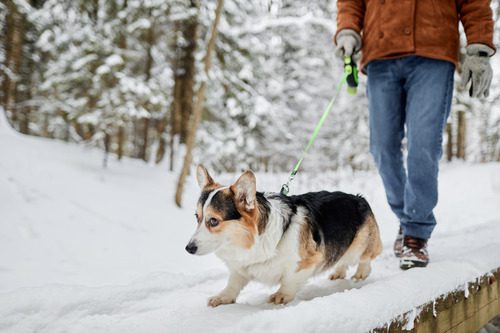When Is It Too Cold to Walk Your Dog?
As winter approaches and temperatures start to drop, pet owners often wonder about the safety of walking their dogs in cold weather. Ensuring your dog’s comfort and safety during winter walks is essential to keeping them healthy and happy. In this blog, we will explore how to determine when it’s too cold to walk your dog, the signs of cold-related distress, and tips to make winter walks enjoyable for both you and your furry friend. If you have concerns about walking your dog in cold weather, contact Acton Animal Hospital at 978-263-7477 for expert advice.

Understanding Your Dog’s Tolerance to Cold Weather
Dogs have varying tolerance levels to cold weather, influenced by factors such as breed, size, age, and health. Breeds with thick coats, such as Huskies and Malamutes, can handle colder temperatures better than short-haired breeds like Chihuahuas or Greyhounds. Smaller dogs, senior dogs, and those with health issues are also more susceptible to the cold.
Breed and Coat Type
Certain breeds are more equipped to handle cold weather due to their natural insulation. Dogs like Huskies, Malamutes, and Newfoundlands have thick double coats that provide excellent protection against the cold. Conversely, breeds like Greyhounds, Boxers, and Chihuahuas have thin coats and little body fat, making them more vulnerable to the cold.
Age and Health Considerations
Puppies, senior dogs, and dogs with health conditions are generally less tolerant of cold weather. Their bodies may struggle to regulate temperature, making them more susceptible to hypothermia and frostbite. Always take extra precautions when walking these dogs in cold weather.
Signs of Cold-Related Distress in Dogs
Understanding the signs of cold-related distress is crucial to ensuring your dog’s safety during winter walks. Pay attention to your dog’s behavior and physical condition while outside.
Behavioral Signs
Dogs show various behavioral signs when they are too cold. These include shivering, whining, and reluctance to keep walking. If your dog frequently lifts their paws off the ground or tries to seek shelter, it’s time to head home.
Physical Symptoms
Physical symptoms of cold-related distress include pale or blue gums, lethargy, and stiffness. Hypothermia and frostbite are serious conditions that require immediate veterinary attention. If you notice any of these signs, bring your dog indoors and contact Acton Animal Hospital at 978-263-7477.
Tips for Safe Winter Walks
There are several ways to ensure your dog’s safety and comfort during winter walks. Proper preparation and protective gear can make a significant difference.
- Dress Appropriately: Invest in a high-quality dog coat and boots. A coat can help retain your dog’s body heat, while boots protect their paws from ice, salt, and cold surfaces. Make sure the gear fits well and does not restrict movement.
- Limit Walk Duration: Shorten the length of your walks during extremely cold weather. Instead of one long walk, consider multiple shorter walks throughout the day. This reduces your dog’s exposure to the cold while still providing necessary exercise.
- Choose the Right Time: Walk your dog during the warmest part of the day, typically between late morning and early afternoon. Avoid early morning and late evening walks when temperatures are at their lowest.
Maintaining Paw Health in Cold Weather
Winter conditions can be harsh on your dog’s paws. Snow, ice, and salt can cause irritation and injury. Taking care of your dog’s paws is essential during cold weather walks.
Protecting Paws
Using dog boots can protect your dog’s paws from the harsh elements. If your dog is not comfortable with boots, consider using a paw balm to create a protective barrier against the cold and salt.
Post-Walk Care
After each walk, check your dog’s paws for any signs of injury or irritation. Wipe their paws with a damp cloth to remove any salt or de-icing chemicals, which can be harmful if ingested. Regularly trim the fur between your dog’s paw pads to prevent ice buildup.
Creating a Positive Walking Experience
Walking your dog in cold weather can still be an enjoyable experience with the right approach. Ensuring your dog is comfortable and safe will make winter walks pleasant for both of you.
Engaging Activities
Incorporate engaging activities during your walks to keep your dog mentally stimulated. Bring along a favorite toy or treat to encourage play and reward good behavior. This keeps your dog focused and happy despite the cold.
Socialization Opportunities
Winter walks can also provide valuable socialization opportunities. Meeting other dogs and people can help keep your dog mentally and socially active. Just be mindful of the weather and ensure all interactions are safe and brief.
Knowing When to Stay Indoors
There are times when it’s best to skip the walk and opt for indoor activities instead. Extreme cold weather can be dangerous for both you and your dog.
Alternative Indoor Exercises
On days when it’s too cold to walk outside, consider indoor exercise alternatives. Play fetch in a safe, enclosed space, or set up an obstacle course using household items. Mental stimulation games, such as puzzle toys, can also provide valuable exercise.
Monitoring Weather Conditions
Keep an eye on the weather forecast and be aware of any extreme cold warnings. If temperatures are dangerously low, it’s best to keep your dog indoors. Consult with Acton Animal Hospital for advice on managing your dog’s exercise needs during these times.
Safeguarding Your Dog’s Comfort During Winter Walks
Walking your dog in cold weather requires careful consideration and preparation. By understanding your dog’s tolerance to cold, recognizing signs of distress, and taking appropriate precautions, you can ensure their safety and comfort during winter walks. Always prioritize your dog’s well-being, and contact Acton Animal Hospital at 978-263-7477 if you have any concerns or questions about walking your dog in cold weather.
Recent Posts
About Us
Our veterinarians in Acton, MA bring over 80 years of combined experience and a multitude of services for your pet.
